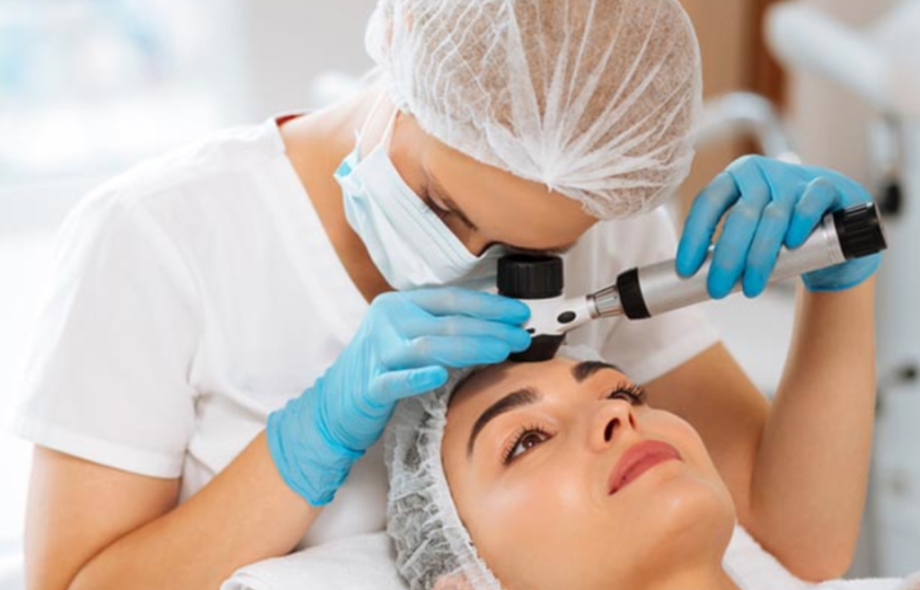Many women and men suffer from an oily scalp, which can cause embarrassment due to the oily appearance of their hair or the appearance of annoying dandruff. Although oil secretion is normal to keep the scalp moisturized, excessive oil secretion may indicate a problem that requires consulting a Dermatologist In Dubai to determine the cause and develop an appropriate treatment plan. Proper care for an oily scalp is not limited to using shampoo alone; it also depends on understanding the nature of the scalp and the daily care regimen recommended by the doctor.
First: What is an oily scalp?
An oily scalp is one in which the sebaceous glands secrete an excessive amount of sebum (the natural oil) that coats the hair follicles. This oil is essential for protecting the hair from dryness, but when secreted in excessive amounts, it can lead to clogged pores, dandruff, and, in some cases, hair loss.
The most prominent signs of an oily scalp include:
Hair that is excessively shiny, even after washing.
A rapid buildup of oils within a day or less after washing.
Sometimes, an unpleasant odor occurs due to the accumulation of oils.
Yellowish, greasy dandruff that sticks to the scalp.
Second: Causes of Excessive Oiliness of the Scalp
A dermatologist confirms that the factors causing an oily scalp are multiple and often overlap. These include:
Genetic factors: Some people have a natural tendency to secrete excess oil.
Hormonal changes: Especially during puberty, pregnancy, or the use of birth control pills.
Using inappropriate hair products: Such as heavy shampoos or greasy oils that further clog pores.
Washing too frequently or too infrequently: Both disrupt the balance of sebum secretion.
A diet high in fat: Fatty and fried foods negatively affect scalp health.
Psychological stress and tension: These have a direct impact on the activity of the sebaceous glands.
Third: Dermatologist’s Advice for Daily Care of an Oily Scalp
Specialists recommend several steps to help control oily scalp and maintain its natural balance:
1. Choosing the Right Shampoo
Use a shampoo designed for oily hair that contains cleansing ingredients such as salicylic acid, zinc, or sulfur.
Avoid shampoos containing silicone or heavy oils.
It is recommended to wash your hair two to three times a week, depending on the degree of oiliness.
2. The Correct Washing Method
A dermatologist confirms that washing method plays a major role in controlling oiliness:
Gently massage the scalp with your fingertips without vigorous rubbing.
Rinse your hair thoroughly with lukewarm water to remove any shampoo residue and oils.
Avoid hot water, as this stimulates the sebaceous glands to secrete more oil.
3. Avoiding Heavy Oils and Root Conditioners
Apply conditioner only to the ends of your hair, not to the scalp.
Avoid using oils or greasy creams on the roots, as they further clog pores and exacerbate the problem.
4. Exfoliate your scalp regularly
Regular exfoliation is highly recommended by doctors, as it helps remove excess oil and dead skin cells.
Use a natural exfoliant, such as sugar, with your shampoo once every two weeks.
Or use a medicated exfoliant containing AHAs, which deeply cleanse without irritating the scalp.
5. Avoid touching your hair frequently
Touching your hair with dirty hands or excessively brushing it distributes oils from the scalp to the rest of the hair, making it appear oilier.
Fourth: The role of diet in reducing scalp oiliness
A dermatologist warns that scalp care also starts from within, as a balanced diet plays a key role in regulating oil secretion.
Reduce your intake of fried foods and foods high in saturated fats.
Drink more water to stay hydrated.
Eat foods rich in zinc and vitamin B6, such as nuts, fish, and whole grains.
Include leafy green vegetables and fresh fruits in your daily diet.
Fifth: Medical Treatments for Oily Scalp
In some cases, home care may not be sufficient. This is where a doctor can prescribe specialized treatments, such as:
Medicated shampoos: Contain antifungal and antibacterial ingredients.
Low-intensity laser therapy: Helps improve blood circulation and strengthen hair follicles.
Mesotherapy injections: Used to inject vitamins and minerals that regulate oil secretion and stimulate healthy hair growth.
PRP therapy: Restores the scalp’s vital balance and reduces inflammation caused by oil buildup.
Sixth: Additional tips from a dermatologist to avoid worsening the problem:
Change your pillowcase regularly, as accumulated oils can re-infect the scalp.
Avoid covering your head for long periods with hats or scarves without ventilation.
Wash your hairbrush regularly, as it collects oil and dust.
Make sure to trim your hair regularly to maintain a healthy, rejuvenated appearance.
Seventh: Differences Between Oily and Dry Scalp
Some people may confuse oily and dry scalps. Here, a dermatologist explains the difference between them:
Oily scalp: Shiny and contains yellow or greasy flakes, and hair appears heavier.
Dry scalp: Itchy and has light white flakes, and hair appears dull and brittle.
Accurate diagnosis helps determine the appropriate type of care to avoid worsening the problem.
Eighth: Caring for an Oily Scalp in Dubai’s Environment
Dubai’s climatic conditions, including high heat and humidity, may increase the activity of the sebaceous glands in the scalp. Therefore, doctors emphasize the importance of:
Washing your hair regularly, especially after sweating.
Avoid prolonged exposure to the sun without protecting your head.
Use mild products designed for hot and humid weather.
See your doctor regularly to ensure your scalp remains clean and balanced.
Conclusion
Oily scalp is a common problem that requires a delicate balance in daily care between cleanliness and hydration without over-hydration.
 :
https://www.tajmeels.ae
:
https://www.tajmeels.ae

